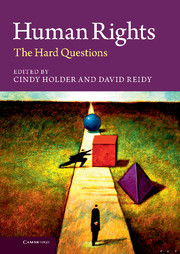Book contents
- Frontmatter
- Contents
- Figure
- List of table
- Notes on contributors
- Introduction
- Part I What are human rights?
- 1 Human rights and human nature
- 2 Universalism and particularism in human rights
- 3 Are human rights universal?
- Part II How do human rights relate to group rights and culture?
- Part III What do human rights require of the global economy?
- Part IV How do human rights relate to environmental policy?
- Part V Is there a human right to democracy?
- Part VI What are the limits of rights enforcement?
- Part VII Are human rights progressive?
- Index
- References
2 - Universalism and particularism in human rights
Published online by Cambridge University Press: 05 May 2013
- Frontmatter
- Contents
- Figure
- List of table
- Notes on contributors
- Introduction
- Part I What are human rights?
- 1 Human rights and human nature
- 2 Universalism and particularism in human rights
- 3 Are human rights universal?
- Part II How do human rights relate to group rights and culture?
- Part III What do human rights require of the global economy?
- Part IV How do human rights relate to environmental policy?
- Part V Is there a human right to democracy?
- Part VI What are the limits of rights enforcement?
- Part VII Are human rights progressive?
- Index
- References
Summary
Introduction
The relationship between universal and particular ways of thinking about our ethical commitments has an important bearing on the sustainability, desirability and shape of the global promotion of human rights today. It is a relationship that combines mutual support with mutual tension. On the one hand, most who take human rights seriously, whether as objective moral truth or as socially constructed consensus, believe there is an internal connection between the very idea of human rights, with its strong suggestion of the equal worth of all humans, and a common standard of protection, with all that implies by way of universals (Waldron 1987). On the other hand, and partly due to the same background modernist considerations of equal value and equal respect for all expressions of individual and collective autonomy in contradistinction to the pre-modern emphasis on conformity with a pre-given order, many believe that any rights-regarding regulatory architecture must accommodate difference – and so particularize – in a manner that qualifies or even challenges the underlying universalism (Vincent 2002).
Take first the universalist pole. To believe in rights as something we possess just in virtue of being human implies also believing in the “universality” of rights – whether the “negative” rights of liberty, conscience, expression, privacy, etc., or the “positive” rights of shelter, subsistence, etc. – in the following three respects and stages: first, as to the general quality of what is covered (i.e., its terms should not be so qualified that there remains no significant range of situations – of “core” contexts – across which the right is capable of being universally asserted); second, as to the equal and so uniform application of the general right to all within the protected category; and, third, as to the extensive, ideally unlimited category of persons protected.
- Type
- Chapter
- Information
- Human RightsThe Hard Questions, pp. 39 - 58Publisher: Cambridge University PressPrint publication year: 2013
References
- 3
- Cited by

